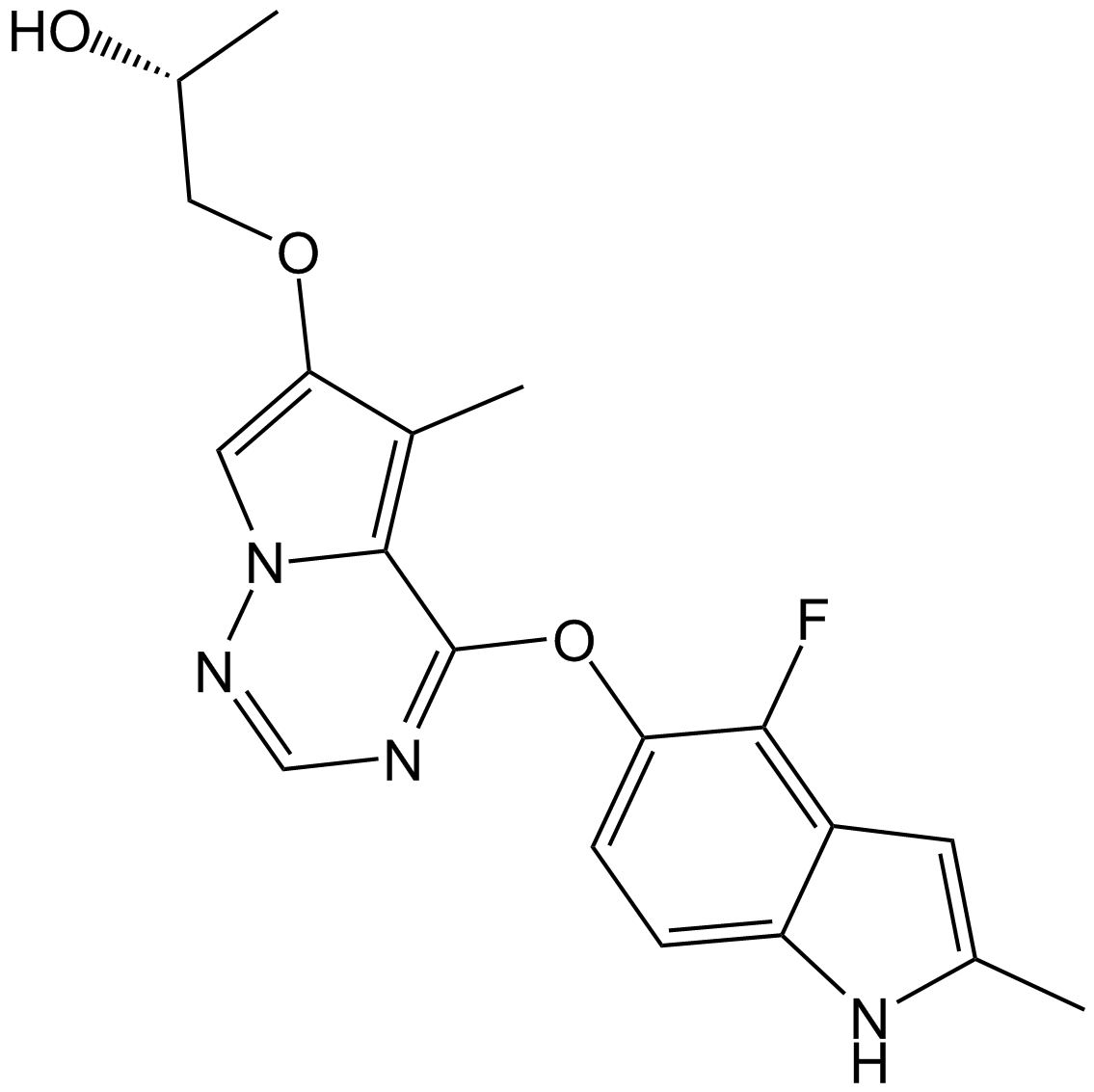Brivanib (BMS-540215) (Synonyms: BMS 540215) |
| カタログ番号GC11692 |
ブリバニブ (BMS-540215) (BMS-540215) は、VEGFR2 に対する ATP 競合阻害剤であり、IC50 は 25 nM であり、VEGFR-1 および FGFR-1 に対しては中程度の効力を持ちますが、PDGFR-β に対しては >240 倍です。
Products are for research use only. Not for human use. We do not sell to patients.

Cas No.: 649735-46-6
Sample solution is provided at 25 µL, 10mM.
Brivanib is an ATP competitive inhibitor of human VEGFR-2 with IC50 value of 25nM [1].
Brivanib is a selective RTK inhibitor that targets signaling via VEGFR2 and 3, and FGFR1, 2 and 3. Targeting both VEGF and FGF signaling pathways inhibits tumor growth in RT2 mice, with VEGF signaling predominating in initiation of tumor angiogenesis, Currently, brivanib therapy is being evaluated in phase III clinical trials in colorectal carcinoma and hepatocellular carcinoma (HCC) and in phase II trials for numerous indications including brivanib second-line therapy following sorafenib failure [2].
Brivanib has moderate potency against VEGFR-1 and FGFR-1 and good selectivity against PDGFR-β. In the preclinical in vivo mouse models, it is also found to be a good inhibitor of Flk-1, the mouse homologue of VEGFR-2 with IC50 value of 89 nM. Brivanib is reported to inhibit the proliferation of human umbilical vein endothelial cells (HUVEC) with potency against VEGF-stimulated HUVECs and FGF-stimulated HUVECs. The IC50 values are 40 nM and 276nM respectively. When tested against human tumor cell lines, Brivanib shows lower antiproliferative potency. In particular, activity was low against the cell line used in the in vivo tumor xenograft mouse efficacy model (H3396) [1].
References:
[1] Rajeev S. Bhide, Zhen-Wei Cai, Yong-Zheng Zhang, Ligang Qian, Donna Wei, Stephanie Barbosa, Louis J. Lombardo, Robert M. Borzilleri, Xiaoping Zheng, Laurence I. Wu, Joel C. Barrish, Soong-Hoon Kim, Kenneth Leavitt, Arvind Mathur, Leslie Leith, Sam Chao, Barri Wautlet, Steven Mortillo, Robert Jeyaseelan Sr., Daniel Kukral, John T. Hunt, Amrita Kamath, Aberra Fura, Viral Vyas, Punit Marathe, Celia D’Arienzo, George Derbin, and Joseph Fargnoli. Discovery and Preclinical Studies of (R)-1-(4-(4-Fluoro-2-methyl-1H-indol-5-yloxy)-5-methylpyrrolo[2,1-f][1,2,4]triazin-6-yloxy)propan-2-ol (BMS-540215), an In Vivo Active Potent VEGFR-2 Inhibitor. Journal of Medicinal Chemistry. 2006, 49 (7): 2143-2146.
[2] Elizabeth Allen, Ian B. Walters, and Douglas Hanahan. Brivanib, a Dual FGF/VEGF Inhibitor, Is Active Both First and Second Line against Mouse Pancreatic Neuroendocrine Tumors Developing Adaptive/Evasive Resistance to VEGF Inhibition. Clinical Cancer Research. 2011 (17): 5299-5310.
Average Rating: 5 (Based on Reviews and 40 reference(s) in Google Scholar.)
GLPBIO products are for RESEARCH USE ONLY. Please make sure your review or question is research based.
Required fields are marked with *




















